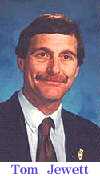'The Review' - A Historian's Exploration

Daniel P. Barr
Why the recent surge in colonial backcountry research by members of the academic community? More importantly, what does this flurry of scholarship mean and how might it affect our view of the American frontier? Daniel Barr, an author new to our pages, attempts to answer these questions with his article, "Beyond the Pale: An Overview of Recent Scholarship Pertaining to the Backcountry."
Mr. Barr, a teaching fellow at Kent State University, provides us with a comprehensive survey of where historians have been and where they are now headed in their exploration of the Trans-Appalachian frontier. The importance of such scholarship in shedding light on this black hole in our nation's history cannot be minimized. His paper is meticulously researched and well worth your time. Who knows, it might serve to encourage some among us to pursue the subject on our own.
Author of numerous articles, essays and reviews on the American frontier, Mr. Barr (babybear@pgh.net), is currently investigating the experience of Indian captivity during the French and Indian War.

Fortunately for our readers, Professor Tom Jewett returns again with another of his revealing vignettes. This time Professor Jewett explores Thomas Jefferson's relationship with his daughters, Martha and Maria. Jefferson's views on women in general and wives in particular make for colorful reading. In letters to his daughters, Jefferson sets forth exactly how they should dress, the skills they need to acquire, defining their place and behavior in America of the day.
Author Jewett (tjewett@siue.edu) is Associate Professor at Southern Illinois University at Edwardsville.

Joseph A. Zavaletta
Congress passes legislation, and the President is empowered to either sign it or no. When it comes to resolving the knottiest of issues, those dealing with constitutional rights and wrongs-- most of us have come to look to the Supreme Court of the United States as the final arbiter. That's the way it was established by our founding fathers, right?
Not so, says Joseph A. Zavaletta, in his penetrating essay "Original Intent and The Free Exercise of Religion." Zavaletta, Assistant Professor of Legal Studies at the University of Texas at Brownsville, makes the case that the framers of the Constitution chose the legislature, not the judiciary as the predominant branch of government. In arriving at his thesis, he posits that natural law is the legal foundation of our constitutional law and "original intent" is to be used to interpret the Constitution and the Bill of Rights.
In his essay Professor Zavaletta uses the First Amendment and the "wall of separation between church and state" to illustrate his point. The view he sets forth is powerfully made, citing writings of the framers, the records of the Constitutional Convention, Jefferson, Madison, and "centuries of legal tradition in the common law."
A National Hispanic Scholar, Professor Zavaletta (jzavaletta@UTB1.UTB.EDU) is a former trial attorney who now teaches Legal Studies at the University's School of Business at Brownsville. He received his Doctor of Jurisprudence and Master's in Public Policy from Regent University College of Law and Government, Virginia Beach, Virginia.

James P. Pierce
Professor James Pierce's observation is right on the mark as he explores the life and times of German-American long hunter Michael Stoner. One of the best long hunter frontiersmen of the late 18th century, Stoner is the subject of Pierce's article "Michael Stoner, the Frontiersman Who Was Always There."
Stoner, a lifelong friend and compadre of Daniel Boone, has been pretty much overlooked-- if not downright ignored by America's historians. There are reasons for Stoner's obscurity, and author Pierce offers his explanations in convincing fashion. In the process he provides us with a fascinating account of a frontier hunter involved in numerous military campaigns and battles waged both during and after the Revolutionary War. We are in Professor Pierce's debt for introducing us to a relatively unsung historical figure who accomplished much, one who played an important role on America's frontier.
Professor Pierce (jpierce@sos.net) is an instructor in German language, math and chemistry at Skagit Valley Community College in Mt. Vernon, Washington.

Brian D. McKnight
The pivotal influence of the Committee of Correspondence and Inquiry in shaping colonial America's move toward independence is set forth by author Brian McKnight. An instructor in American History at East Tennessee State University, McKnight profiles the committee's who who, including the likes of Thomas Jefferson, Patrick Henry, Peyton Randolph and both Lees-- Richard Henry and Francis Lightfoot. From its inception in March of 1773 to its eventual denouement eighteen months later, the Committee and the men who gave it life is carefully detailed. Author McKnight presents us with the behind-the-scenes politics necessary to understand this often overlooked opposition to British encroachments.A graduate of Clinch Valley College of the University of Virginia, Mr. McKnight (brian1@mounet.com) contributed a chapter entitled "The Ku Klux Klan and the End of Reconstruction" in an anthology published this year by Harcourt Brace. He is currently writing several entries for The Encyclopedia of the American Civil War to be published by ABC-CLIO in 1999.
The answer, according to author Geoffrey Hoerauf in his article entitled "American Spies and Sympathizers at Fort Detroit," was to recruit spies among the area's French inhabitants, native Americans and even some British subjects. The recruitment efforts eventually paid off, hampering British operations in the region.
Mr. Hoerauf's article cites a number of British actions taken to thwart the American spies. But no matter. When British forces finally abandoned the post in 1796, the pro-American presence was still successfully in evidence.
Popular Cities
Popular Subjects
Industrial Engineering Tutors
Kurdish Tutors
Computer Science Tutors
Network Science Tutors
Biology Tutors
Series 30 Tutors
SAT Subject Test in Spanish Tutors
Quantum Mechanics Tutors
Critical Thinking Tutors
Algebra Tutors
CCNA Industrial - Cisco Certified Network Associate-Industrial Tutors
EMT Certification Tutors
Physical Chemistry Tutors
English Tutors
Quantitative Psychology Tutors
MCAT Tutors
Statway Tutors
Statistics Graduate Level Tutors
Mandarin Chinese 3 Tutors
Heroes of the Storm Tutors
